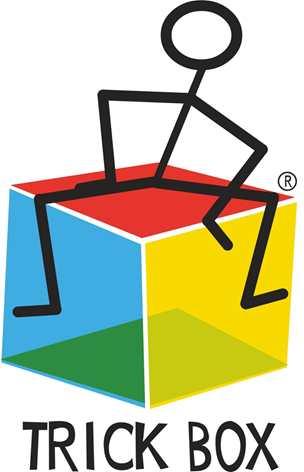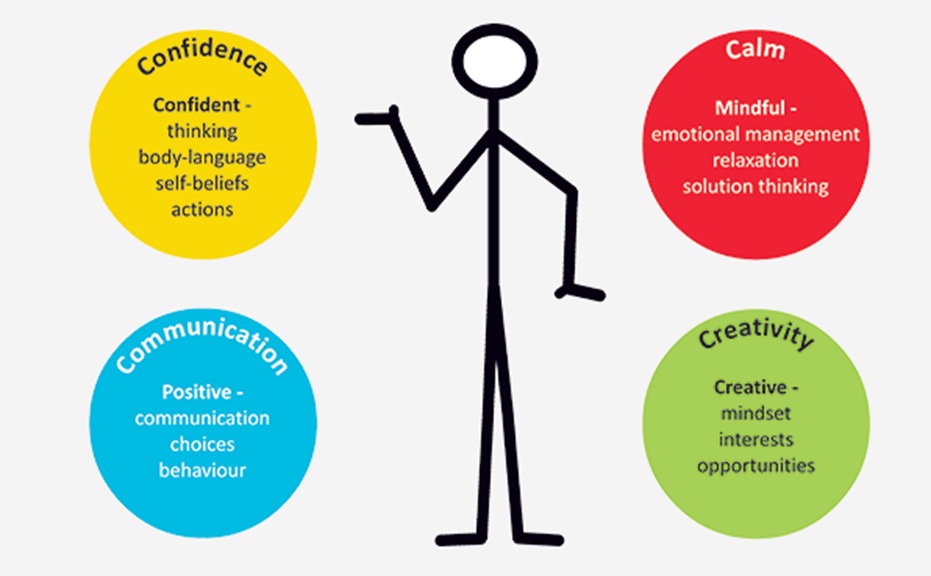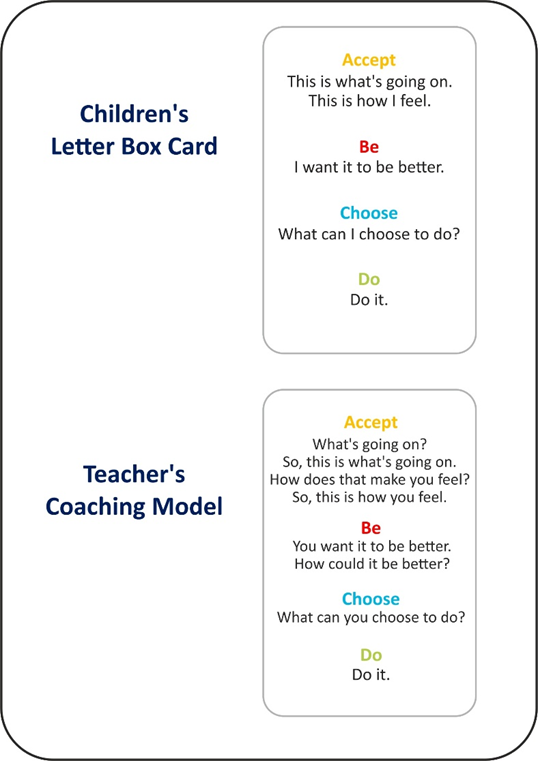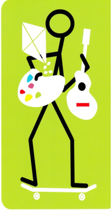Trick Box

Trick Box Is an amazing strategy that we use to develop children’s ability to cope and develop life skills and to support children's emotional wellbeing, both in school and beyond. It’s simple, fun and effective. It is designed as a parent/school/child tool to help children develop positive life habits and self- help strategies. It is focusses on the 4Cs: Confidence, Communication, Creativity and Calmness.

The intention of Trick Box is to help children to develop happy and healthy habits early in their lives. These habits include to:
- Recognise and self-manage emotions
- Develop mindful awareness around body and mind connections
- Build awareness and choices
- Create confident, mindful decision making
- Set and achieve positive goals
- Develop communication skills to enhance interpersonal relationships
- Problem solve and create solution thinking
- Build confidence to try new things in new ways
- Develop positive mindset building long-term resilience
The model that Trick Box uses teaches children the following:

It consists of 24 simple visual tricks which children are introduced to throughout their time at Holy Trinity. Each trick is developed further, revisited and applied as they move up through school.
A box of Trick Box cards can be purchased at the school office for £5.
Reception
|
Autumn 1 Mirror Mirror |
Autumn 2: Stand Tall |
Spring 1: Breathing Colour |
|
|
|
|
|
It is important that we are on our own side and get used to saying nice things to ourselves. Well done You’re doing your best You can do it Keep going |
Our body language tells others how we are feeling inside. I’m thinking - I feel good today, I feel strong inside like I’m doing well, I feel confident. I am standing tall. |
Put your hands on your chest and tummy. Breathe slowly through your nose into your tummy not your chest. Feel your tummy come up. Now breathe out slowly through your nose until your tummy goes down again. Well done! It makes you feel nice and relaxed. Do this 3 times. We can relate colours to feelings. Which is your angry colour? Which is your calm colour? Breathe in your calm colour and breathe out your angry colour. |
|
Spring 2: Floating Cloud |
Summer 1: Win Win |
Summer 2: Free Flow |
|
|
|
|
|
Put your hands on your chest and tummy. Breathe slowly through your nose into your tummy not your chest. Feel your tummy come up. Now breathe out slowly through your nose until your tummy goes down again. Well done! It makes you feel nice and relaxed. Do this 3 times. Imagine you are floating on a big, thick, soft, fluffy cloud….that feels nice doesn’t it! Clench your feet and toes and now relax them. Good. Move through the whole body like this from the toes to the head, tensing and relaxing each part. |
We don’t always think the same way as someone else or want to do the same things but we can often find a way to make sure both people are happy and both people feel like they have won. Learn to negotiate! |
Allow time to explore a variety of possible interests. Practice the ones you enjoy and explore new ones…you might find something you love and excel at! We can all enjoy practising doing the things we already like and doing new things too. |
Year 1
Children will also revisit the tricks from Year R.
|
Autumn: Big Voice |
Spring: Sunny Side |
Summer: Light Bulb |
|
|
|
|
|
Sometimes we can feel like giving up if something is hard or we don’t really like doing it. What can you do when you feel like that to help yourself? I like to say to myself in a big voice inside my head, “Come on, you can do it.” It makes me feel better then I can have another go. |
Life doesn’t always go according to plan and when things change, expectedly or not, we need a mental strategy to deal with this. We can develop some positive thinking patterns where the brain becomes more flexible at finding solutions by learning to reframe how we perceive events. Do I have to feel like that or could I choose to think about it in another way? |
Sometimes we get worried because we can’t find an answer to a problem. Sometimes we need to talk to grown up but sometimes we can find the answer ourselves.
First relax…You could use Breathing Colour or Floating Cloud. Then think about something else or do something else for a bit or think about it in a different way and let our clever brains and let our clever brains come up with the answer! |
Year 2
Children will also revisit the tricks from Year R and Year 1.
|
Autumn: Magic Circle |
Spring: Big No |
Summer: Big Yes |
|
|
|
|
|
Pick something that makes you feel strong insider and confident when you do it.
Do this whenever you experience a new confident moment. When you need confidence, make a magic circle. |
Setting our own personal boundaries helps us feel secure. It is OK to say no if someone is asking you to do something that might hurt you or someone else; like doing things that are unkind, hurt feelings or hurt bodies.
Make sure that your body language matches your voice and intention when setting boundaries so you are not open to manipulation from others. |
Saying “yes” means not to be afraid to stretch our comfort zones but also being mindful of our personal choices and boundaries.
Think first… is this a good idea for me? Listen to what your gut tells you. If it is, you could use tricks to help you.
|
Year 3
Children will also revisit the tricks from Year R - Year 2
|
Autumn: Stand as if |
Spring: Signal Change |
Summer: Ask How |
|
|
|
|
|
Our minds and bodies work together to help us. Deliberately changing or choosing body stances can affect our mental states, moods and energy. Think about the thing you want to be better at doing. Now stand as if you feel strong and confident and can do it easily. Breathe as if you are strong and confident. Well done, do this when you need to. |
Just as we start to do something we want to change e.g something unkind, we can say to ourselves instead, “stop get ready to do something else and go and do that”. |
Ask yourself empowering questions these questions. So ask: “How can I do this?” “How can I do this better?”
What “how” questions can you ask yourself to get better and better about something? |
Year 4
Children will also revisit the tricks from Year R - Year 3.
|
Autumn: Super States |
Spring: Break Through |
Summer: Brilliant Beliefs |
|
|
|
|
|
Our thoughts and emotions affect our physical bodies which influence our behaviour. Think about the thing you want to be better at doing. Now stand as if you feel strong and confident and can do it easily. Breathe as if you are strong and confident. Well done, do this when you need to. |
Our beliefs affect our thoughts and our thoughts affect our bodies and behaviour. Challenging our limiting beliefs helps our brains to develop solution thinking and the creativity needed to handle life events. Instead of saying open “I can't do it” try saying “ I can do it” or “what tricks do we know to help us?” It's OK not to be able to do everything, but some things we can do but we feel fed up trying to do them, then the thought “I can't do it” is getting in the way and we need to move it out of our way so we can move forwards. Imagine the words, “I can do it" is written on a wall in front of you, imagine breaking through that wall. |
There are lots of really great things about us but sometimes we focus on the negative and make ourselves feel bad. We can focus on the negative things about others too and make them feel bad or not enjoy being with them as much because we keep thinking about what's wrong with them rather than their good points. When we focus on the positive or good things about ourselves and others we begin to feel better about ourselves and this helps us to learn to do more and more. Make a list of all the good and positive things about yourself they need to reflect and fit you. You could invite some positive comments from others. Keep adding to your list when someone (including you) notices something positive about you. |
Year 5
Children will also revisit the tricks from Year R - Year 4.
|
Autumn: Super Stretch |
Spring: Calm Thumb |
Summer: Marvellous Me |
|
|
|
|
|
Stretch your comfort zone; Do something new or different. You could use these tricks to help you.
|
Anchoring is an effective way to positively train our body to quickly relax by making an association in our brain between the state of relaxation on our senses. During trick bot lessons year five have been trained to associate relaxing by calmly rubbing their thumb. To relax, breathe slowly and deeply rub your thumb. |
We cannot always expect to receive praise. Balancing recognition of our efforts with outcomes learning to self-praise others and accept constructive criticism or feedback or key skills to our feelings of self-worth and personal development. What you think about yourself is really important. So, if you think you've done something well and nobody else notices, you can say “well done” to yourself or you can tell yourself “well done but you could do better” and feel good about that. This helps you makes you feel confident inside. |
Year 6
Children will also revisit the tricks from Year R - Year 5.
|
Autumn: Different Sum! |
Spring: 123 Magic |
Summer: Great Goals |
|
|
|
|
|
If we keep doing the same thing or think in the same way, then we can expect the same result. In order for a different outcome to occur, we need to do something different to make this happen. We need to create a different sum. |
When problems go round and round our heads, the first thing we need to do is relax you could use colour breathing fun, floating cloud commerce standards if or Sunnyside to help with this. Then try and use a trick to help you think what to do next EG win win, lightbulb, ask how and different some. If a problem feels fixed in your head you could use 123 magic. Close your eyes and put your finger on your forehead and imagine the problem coming out of your head and sticking on your fingertip. Move your finger away a bit at a time until your mind starts to feel more relaxed now that you feel more relaxed you can look at this problem in a new way decide when would be a good time to find solutions to this problem or when you might be able to ask someone for help. |
Think about a goal you would really like to achieve. Choose your own goal and write it or draw it at the top of the paper. Which three steps might you need to take to get there? Close your eyes and imagine taking the first step towards your goal. What can you see and hear as you do this? How do you feel? Can you smell or taste anything? Now do the same for step 2 and then step 3. When you have taken your three steps, you have reached your goal feel how good it feels. Now wiggle your toes and have a big stretch and open your eyes. Well done the more you imagine being successful in meeting your goals, the easier they will be to do. |



